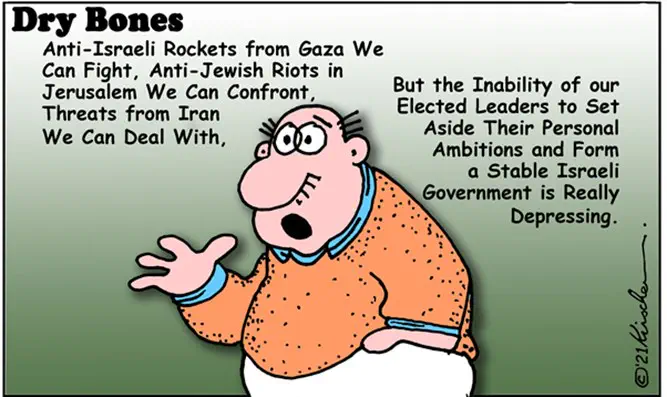David Singer: Israel reels from rockets, riots and arm-wrestlng
Rockets from Gaza indiscriminately targeting Israel’s civilian population and Arab riots targeting Israel’s Jewish population in the streets of Jerusalem seem to have not moved Israel’s politicians to stop engaging in arm-wrestlng in pursuit of their own personal political power.
It is hard to know who is to blame for this current sorry state of affairs: the electors who have brought about - what appears on the face of it - four indecisive elections in two years – or the seemingly-intelligent politicians they have elected who have been unable to reach a compromise on setting up a Government with at least 61 of the Knesset’s 120 currently-elected representatives.
A vendetta continues to be pursued to remove Israel’s longest serving Prime Minister Bibi Netanyahu - despite the overwhelming vote of confidence he and his party received from Israeli voters on 23 March 2021 - 1,066,892 votes.
The following leaders and their respective parties are seeking to replace Netanyahu as Prime Minister or deny him the right to head a right of centre Government:
Naftali Bennett – 273836 votes
Avigdor Liberman – 248370 votes
Gideon Sa’ar – 209161 votes
All three and their respective parties have similar policies and political ideologies as Netanyahu and his allies. Collectively - as Likud, Shas, Yemina, United Torah Judaism, Yisrael Beytenu, Religious Zionism and New Hope - they comprise 72 of the 120 Knesset members.
These three leaders need to fall in behind Netanyahu to end the political uncertainty steadily eroding Israel’s ability to deal with the challenges it is facing – not only from rockets and rioting – but from the continuing confrontation with Iran, Hezbollah, the International Criminal Court, a hostile United Nations and the Biden Administration.
That this appalling political stand-off could have also been avoided in the three previous elections is an indictment on the common obstructionist denominator in all four elections: Avigdor Liberman
Congress Needs to Review UN Agency's Terror Finance Problem
UNRWA provides no public records detailing its payments or beneficiaries from its cash assistance program. There is also no indication that U.S. authorities run clearance checks prior to making disbursements to UN agencies. In the late 2000s, congressional criticism of how the U.S. Agency for International Development handled Gaza-based assistance forced an overhaul of its anti-terrorism vetting. It now pre-clears every potential recipient of U.S. assistance, including sub-contractors. The same standard should be set for UNRWA.'There's no such thing as occupied Palestinian land,' legalist says
In this year's foreign aid bill, Congress should condition U.S. assistance to UNRWA on thorough anti-terror vetting for all UNRWA expenditures prior to disbursement. UNRWA staff, contractors and recipients of cash assistance should be vetted to ensure that they don't have ties to terrorism. Legislation should require the State Department to halt and claw back U.S. funding if the agency declines to turn over its payroll, contractor and beneficiary information for vetting.
Congress can also legislate broader reforms. Since UNRWA is a welfare agency—not a refugee agency—the U.S. government should not use scarce refugee assistance dollars to support it. Wherever possible, assistance should transition away from UNRWA and toward bilateral aid programs that help Palestinians achieve self-sufficiency. Any contribution to UNRWA should also be contingent on allowing the U.S. to independently audit its books. American taxpayers should not trust China with ensuring UNRWA's financial transparency.
Congress should consider two other conditions for future assistance to UNRWA: verification that textbooks used in UNRWA schools do not include anti-Semitic content, incitement or extremism and a requirement that UNRWA return all contributions should the U.S. discover its facilities are being used by terrorist organizations to store weapons or equipment.
UNRWA's steering millions of dollars to terror group affiliates should alarm U.S. taxpayers and their representatives in Congress. If the Biden administration wants to restart U.S. funding to UNRWA, congressional appropriators should insist that funding be contingent on verifiable reform. Congress must ensure that humanitarian aid reaches the Palestinian people, not terrorist group affiliates.
Dr. Jacques Gauthier is a Canadian lawyer and international law expert who is currently the greatest expert on the San Remo Conference, during which the legal infrastructure for the Jewish state was laid in 1920.Amb. Alan Baker: Refuting the Palestinian Allegation to the ICC that Israeli Settlements Are a War Crime
Gauthier, whose life's work has been devoted to proving the legitimacy of the Jewish claim to Jerusalem and Judea and Samaria under international law, says the question of the legitimacy of the settlement enterprise – and the legal basis of Israel's very existence – is one of crucial importance.
He believes that for Israel and the Jewish people, it is imperative not to lose sight of what was theirs in the past.
Over the past two decades, the legal arena has become rife with propaganda by left-wing organizations and by the Palestinians, giving way to the rise of a new term: Lawfare- the misuse of legal systems and principles against with aim to delegitimizing the adversary, wasting their time and money, or winning a public relations victory.
In this reality, the question is simple, Gauthier says: Are Jews living east Jerusalem, or as settlers in Judea and Samaria, or in Hebron, or even within the Green Line legal residents? Do they own land and property that are not actually theirs?
Israel's critics, he explained, claim that Jews should be barred from living in certain areas in the country, so the question of justice and sovereignty is crucial because if the right granted over the entire territory exists within the framework of international law – then the Jews are not in breach of the law.
According to Gautier, Israel lacks sufficient understanding and recognition of the historical rights of the State of Israel as a Jewish state.
Israel’s settlement activity cannot be considered as a “war crime” in the context of the ICC Statute. The overriding criteria established by the Statute for war crimes include the requirement that such activity be “part of a plan,” “done on a large scale,” and be “of sufficient gravity as to justify further action by the Court.” Israel’s settlement activity does not fill any of these overriding criteria. Therefore, the allegation of a war crime cannot be considered admissible by the Court.The Joshua and Caleb Network: Joe Biden's Undercover Building Freeze - on Israel
Israel’s settlement activity is conducted in accordance with the requirements of international customary law, which enables the legitimate use of state and non-privately owned land and property, pending resolution of the conflict. Strict measures are taken by Israel’s investigative and judicial authorities to ensure that violations of laws and norms are duly investigated and prosecuted. Israel’s ongoing legal and juridical supervision fulfills the complementarity requirement of the ICC Statute.
The most important legal document used to evaluate the legality of Israel’s settlement activity has been the 1949 Fourth Geneva Convention. As clarified by the ICRC Official Commentary to that document, the population transfer prohibition set out in the Convention was specifically drafted to address a repeat of the mass, forced population transfers conducted by the Nazis during the Second World War. As such, it is not applicable to Israel’s settlement activity.
The “transfer” prohibition in Article 8 of the ICC Statute does not reflect established international law inasmuch as it was deliberately tailored and manipulated to address Israel’s settlement activity. As such, Israel’s settlement activity cannot be seen to fulfill the Statute’s overriding requirement that such a crime be within the “established framework of international law.”
The Oslo Accords established an agreed legal regime enabling each party to conduct planning, zoning, and construction activities within the areas under its respective jurisdiction, pending the outcome of the permanent status negotiations. Israel’s investigative and judicial institutions regulate all such construction activity, including, where necessary, investigating and prosecuting violations. Such activity fulfills the complementarity requirement of the ICC Statute.
Israel’s official governmental commission to investigate the legality of construction in the territories established strict criteria prohibiting seizure and use of private property in violation of international law and requiring that construction be carried out in accordance with the law. The observance of such criteria fulfills the complementarity requirement of the ICC Statute.
Adventure Show #2 is here! This week, we’re answering a similar question to our first adventure show, but in a different location. Is there a Jewish housing crisis inside the Israeli settlements in Judea and Samaria? You might be shocked to find out the answer.
We started the day by visiting what some might call an Israeli outpost. There we talked to Nati Rom, Jewish attorney and a settlement founder. Nati explained how building Jewish homes in the heartland is vastly different than building Arab homes.
The second half of the show we visited an established Israeli settlement that is home to more than 3,000 Jewish people. Here we hear from the city manager, Chaim Margolis about the difficulties that the community faces when building and expanding, even after being in existence for 30+ years!









































